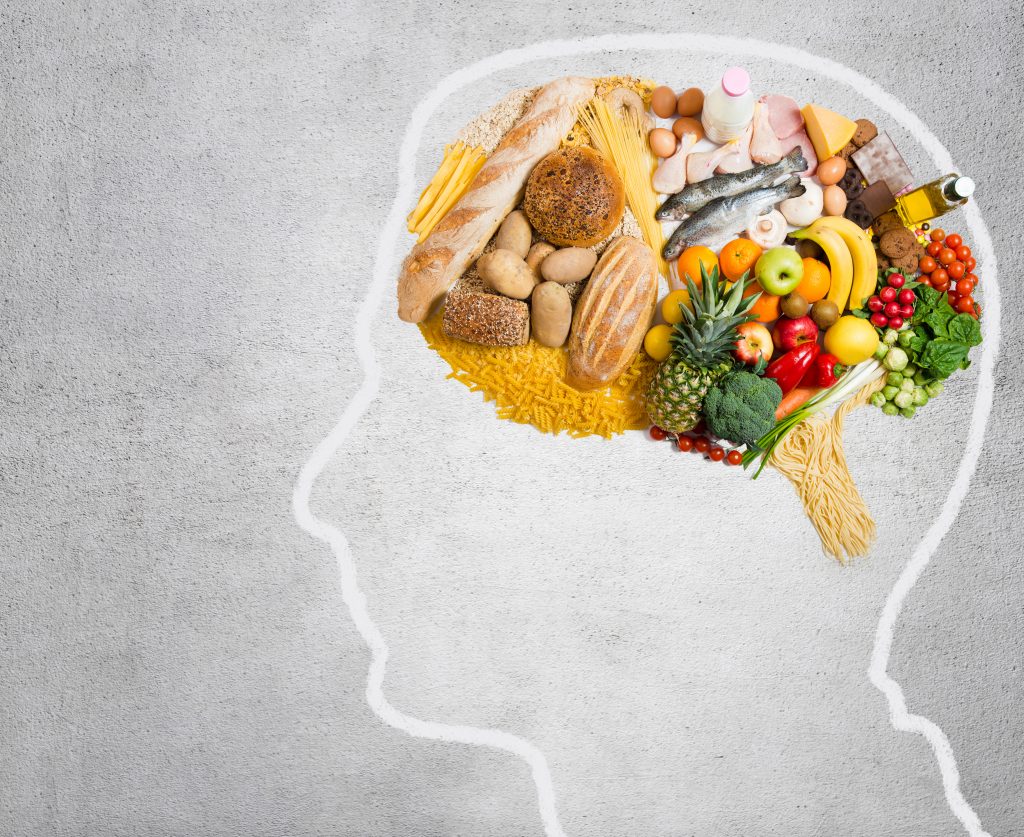The spread of COVID-19 is a new and challenging event impacting our mood that can leave us feeling worried, anxious and stressed. This impact on our mood can affect our dietary habits. During difficult times like this, it is more important than ever to look after our general health and eating well is a huge part of that. Eating a healthy diet can do a lot to improve our mood and sense of wellbeing whilst also impacting our performance at work. Research has shown how improving our diet can help generate more positive feelings, lead to clearer thinking, increase energy levels and help develop calmer moods (1). There is a very strong link between food and mood (2). What we eat and how we feel is so closely linked and one has a powerful impact on the other. We live in an age right now where there is a lot of scientific research coming out regarding how the body, mind and food are connected and form a foundation of long-term health. Our daily routines are affected by the COVID-19 outbreak in different ways and although it can be a challenge to keep active and eat well during this pandemic, it is essential to our physical health and mental wellbeing that we continue to do so.
Eating Feelings
Emotional eating is the propensity to eat in response to positive and negative emotions (3). Emotions are intimately timed to our food intake. Our brain is evolved to find food intrinsically pleasurable and when we consume sugar and fat it changes our neural chemistry and it triggers reward circuits in the brain. We are hard wired to enjoy food and eating for pleasure is inevitable and totally natural. When we experience emotional eating with negative emotions such as stress, certain brain chemicals are highly influential such as serotonin (happy hormone) and dopamine. When we become stressed these chemical levels decrease. This can then affect our emotional state and we can often feel low, as many of us may be experiencing during this period of isolation. It is understandable to be feeling this way – there is a lot of coverage in the news and COVID is the main topic of discussion with family and friends. It is impacting how we live and disrupting our usual routine. Stress can trigger out of control overeating – this is called disinhibition where we cannot control what we do and leads to continual eating. Stress also increases cortisol levels (stress hormone) which is linked to increased appetite, increased cravings for sugar and fat often causing weight gain (4). When we eat these high sugar and high fat foods, we get an increase in chemicals in our brain, we get more serotonin and our mood goes up. It triggers the dopamine reward circuitry, so we feel better, however, this is only a temporary high that lasts a short period of time.
Some foods are chemically engineered to hit that sweet spot such as cake. Food is short lived, and it has addictive like properties which leave us wanting more (5). During stressful situations we have different individual responses, some people crave more food, others crave less. Some people are so consumed by the demands/focuses on their sources of stress it can lead to difficulty to being in tune with the different signals our body is giving us in terms of hunger or satiety. In these circumstances, individuals might overlook their hunger, leading to long periods of not eating, ultimately causing health & wellbeing issues if this occurs over prolonged periods.
Types of Food to Choose
Therefore, what do we need from a dietary perspective to help support our mood during this isolation period? Ensuring we consume B vitamins to help convert energy from our food is a good place to start. Lack of B vitamins in our diet may result in us feeling lethargic and in more severe cases, feeling depressed. Foods such as wholegrains, fish, eggs, milk, leafy green vegetables, beans and peas, are all excellent sources of B vitamins. Additionally, we need an adequate amount of glucose in our diet to keep us feeling alert and mentally energised. Glucose comes from carbohydrates that include potatoes, pasta, bread, cereals, fruit, vegetables and lactase in milk. Without sufficient glucose in our diet, our brain will run out of energy, leaving us feeling tired and mentally uninformed.
Good sources of omega 3 fatty acids are also vital for our brain health. You can find these essential fats in oily fish such as, salmon, sardines, mackerel, walnuts, flaxseeds and eggs. Research suggests that two portions of oily fish per week can help improve our brain memory, performance, and cognitive & behavioural function (6). Eating healthily does not need to be expensive. There are lots of ways to save money if the budget is tight during this time. Focus on buying canned, frozen or own-brand labelled products. Pre-planning and pre-prepping meals can be extremely beneficial and ensures consistent nutritious meals and helps to remove anxiety around mealtimes during this stressful time. Also, try to resist entering a supermarket without a shopping list, which can lead to stockpiling and impulse buying. Use this spare time at home to plan out meals and experiment with new recipes!
In addition, we must not forget to stay hydrated. The brain is strongly influenced by our hydration status. Mild dehydration (1-3%) can impair brain function and can lead to headaches, lower mood, and affect our working memory, increase feelings of anxiety and fatigue (7). Thus, it is crucial we are drinking the recommended 1.5 – 2 litres of water a day. In order to track fluid intake, a practical tip would be to buy a drinking bottle with measurement units on it and set an alarm to remind yourself to drink 250ml every hour.
Food for Enjoyment
Mindfulness is an awareness which emerges whenever we pay attention to the present moment and it empowers us to make more conscious choices. Are we present when we eat? If we’re not present it can cause a lot of digestive havoc when we are eating. The blood flow can be drawn away from the area of digestion if stressed and we tend to eat more (9-10%) when we are distracted (8). An effective method I practice is mindful breathing – taking three mindful breaths before eating enables me to feel more present and prepared to maximise the pleasure of my food and savour it.
The way we are living our life is changing as the world attempts to limit the spread of COVID-19. As a result, many of us are experiencing extra stress by staying at home and having the temptation of easily accessible food and drink available at all times. It is best if we can try keep some structure to our day and try to stick to structured meal and snack times. Nutrition is an important pillar of a healthy lifestyle along with exercise, sleep, stress management and social connection. In order to perform at our best, our body needs adequate amounts of nutrients. Without them, our mood and energy levels will be significantly affected. What we eat directly affects the function of our brain and ultimately our mood. It is important to give our mind and body the attention it deserves. We should give permission to prioritise our health and not overlook our own needs.
References
[1] Lambert, R. (2017). RE-NOURISH. 1st edn. London: Hodder and Stoughton Publishers
[2] Köster, E. and Mojet, J. (2019). From Mood To Food And From Food To Mood: A Psychological Perspective On The Measurement Of Food-Related Emotions In Consumer Research.
[3] van Strien, T. (2018). Causes of Emotional Eating and Matched Treatment of Obesity. Current Diabetes Reports, 18(6).
[4] Chao, A., Jastreboff, A., White, M., Grilo, C. and Sinha, R. (2017). Stress, cortisol, and other appetite-related hormones: Prospective prediction of 6-month changes in food cravings and weight. Obesity, 25(4), pp.713-720.
[5] Pelchat, M., (2009). Food Addiction in Humans. The Journal of Nutrition, 139(3), pp.620-622.
[6] Damsgaard, C., Lauritzen, L., Hauger, H. et al. (2016). Effects of oily fish intake on cardiovascular risk markers, cognitive function, and behaviour in school-aged children: study protocol for a randomized controlled trial. Trials, 17(1).
[7] Riebl, S. K., & Davy, B. M. (2013). The Hydration Equation: Update on Water Balance and Cognitive Performance. ACSM’s health & fitness journal, 17(6), 21–28.
[8] Coop, Nicola & Cousins et al. (2012). Distraction, the desire to eat and food intake. Towards an expanded model of mindless eating. Appetite. 62, pp.119-126.

